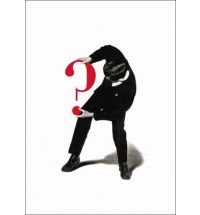Just a quick post in case folks haven’t heard about this already, I got a copy for Christmas.
‘The Interrogative Mood: A Novel?’ by Padgett Powell – A book composed entirely of interrogative sentences, or rather, questions.
It has been hailed as a pioneering yet risky step in the author’s somewhat turbulent writing career, but has received praise from a puzzled many people who have found an unexpected enjoyment and intrigue in its pages, for example:
‘How this book works is beyond me, but, miraculously, it does’ (Village Voice)
‘It is a wondrous strange… a hydra-headed reflection of life as it experienced, and of thought as it is felt’ (New York Times Book Review)
The book is not the first of its kind – ‘Gold Fools’ by fellow American novelist Gilbert Sorrentino is also completely written in interrogative sentences, and tells a Western adventure story whilst challenging and questioning genre-specific stereotypes and contemporary linguistic convention.
Even so, Powell’s book is still unique because it was written to achieve a different objective. Unlike ‘Gold Fools’ there is no chronological story to this ‘novel’ – Powell calls upon every sentence forming configuration in English to dispense vast stores of accrued knowledge, factual information, tantalising and mysterious hints about himself, his memories, and his life. Some interrogatives are curt and challenging, where as others span the length of paragraphs and pages thanks to some pretty serious sentence embedding. Through an agreeable barrage of dos, ifs, ares and all the WH-words, Powell not only covertly feeds us information about himself, but forces us to think deep into the worlds of ourselves and those around us. He presents the reader with moral dilemmas interspersed with comparably routine queries, encouraging us to consider how we might behave faced with a variety of arbitrary and significant choices, highlighting both humorous and perturbing inconsistencies in every arena of life.
Direction and premeditated structure is not immediately apparent in the novel (something to be examined, maybe?) and this works as a selling point. The reader is engaged by Powell’s gentle and inquisitive bullying which encourages self examination, reflection, and increased time spent on Wikipedia trying to source some obscure reference or fact.
A warning though – reading this book hijacks the internal narrative, forcing you to think almost entirely in interrogatives for a good few hours afterwards.


Cool. This reminds me of the novel supposedly written without verbs, and the novel written without using the letter e (also, amazingly, translated into English still without an e).
Thanks for pointing out this cool “Novel.” I was also reminded me of the epistolary novel in which every chapter uses one letter of the alphabet less and the novel in which the first chapter contains only words starting with the letter a, the second chapter only words starting with a or b, etc.; each subsequent chapter adds the next letter in the alphabet to the set of allowed word beginnings.”